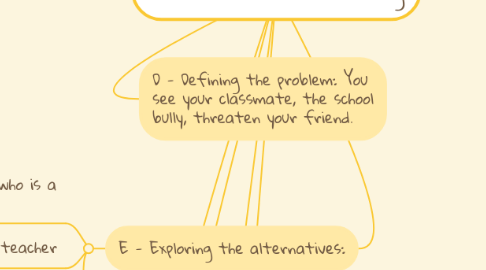DECIDE - decision making
by Kyra Ramesh Krishna

1. E - Exploring the alternatives:
1.1. 1. I can confront the bully who is a friend of mine.
1.2. 2. I can tell a teacher
1.3. 3. I can walk away and not care
2. D - Defining the problem: You see your classmate, the school bully, threaten your friend.
3. C - Considering the consequences:
3.1. 1. The bully may target me next but my friend will feel better that I'm supporting him/her
3.2. 2. The bully and my friend will get mad at me for involving a teacher, but I won't have to confront the bully and my friend won't get bullied
3.3. 3. My friend would continue being bullied and may not talk to me, but the bully won't target me or hurt me
4. I - Identifying my Values:
4.1. I'm not afraid of bullies, and I won't leave a close friend to fend for themselves. I value bravery and loyalty. I'm not the kind of person who would tell on someone or make something harder for a friend. I like to deal with my own problems if I can.
5. D - Decide and Act
5.1. I think I would make a cautious decision - I would go and confront the bully because it fits into my values the best. I would go to my friend and stand by him/her and support him/her and then tell the bully to stop bullying my friend.
6. E - Evaluate the results
6.1. The bully will be mad at me, but my friend would be grateful. I would be happy I helped my friend out and he/she will be happy too that he/she isn't getting bullied anymore. If I had to, I would confront the bully again if my friend was getting bullied. I think that standing up for your friends and your values is good, and I learned that you'll always be happy you did the right thing, whether the consequences are bad or not. I think in the end, it all worked out and everyone got what they deserved, whether they were the bully, the victim or the passerby.


